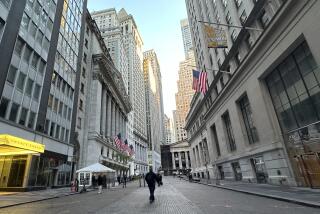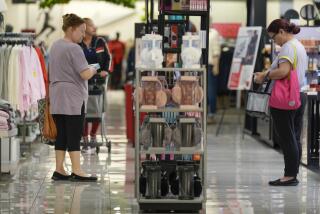Disappointing Retail Sales Reports Leave Stocks Flat; Dow Gains 5 Points
The stock market ended the session nearly flat Thursday after suffering yet another disappointment: retail sales reports that showed consumers aren’t spending at a pace likely to recharge the economy.
Some last-minute buying on Wall Street after a choppy day lifted the major indexes, but ultimately too few investors stepped forward for stocks to make any real progress.
“I don’t think, in general, that people feel there’s a pressing need to put money to work in this market,” said Michael Strauss, managing director at Commonfund. “Six to nine months from now, things will probably look better, but we just have to get through this, and that’s proving difficult.”
The Dow Jones industrial average closed up 5.06 points, or 0.1%, at 10,298.56, barely making a dent in Wednesday’s 165-point loss.
Broader stock indicators were little changed. The Standard & Poor’s 500 index dropped 0.10 of a point, or 0.01%, to 1,183.43, and the Nasdaq composite index fell 3.04 points, or 0.2%, to 1,963.32. Advancers led decliners by 6 to 5 on the New York Stock Exchange, and losers led winners by 7 to 6 on Nasdaq. Trading was moderate.
All three indexes have spent the summer trading in a narrow range as investors buy stocks on hopes the economy is improving and then sell them when it becomes clear it is not.
On Thursday, mixed July sales results from the nation’s retailers became the latest reason for the market’s already foul mood. With consumers beginning to spend their tax rebate checks, the figures suggested that discounters and lower-priced merchants are most likely to benefit.
The results gave Wall Street little hope that consumers, whose spending accounts for two-thirds of the nation’s economy, will help business turn around.
Among retail shares, Gap fell $1.57 to $25.60, Wal-Mart dropped 84 cents to $53.69, and women’s retailer BeBe rose $2.58 to $33.15. Abercrombie & Fitch slumped $6.15 to $29.99.
In the tech sector, meanwhile, Sun Microsystems dropped 49 cents to $16.76, as investors cashed in profits from news of an alliance with Hitachi that drove the stock up Wednesday.
Blue chips also struggled. Banker J.P. Morgan Chase lost 18 cents to $41.90, and DuPont fell 12 cents to $41.40.
Still, the broader market managed to hold its ground--a significant accomplishment considering none of the conditions that had caused Wednesday’s sell-off had changed. Those losses were triggered by a Federal Reserve regional survey that showed widespread weakness across the economy and the country. A mediocre earnings report from Cisco Systems made matters worse.
“There’s a desire to have an idea of what might happen in the near term. The problem is that no one knows what’s next,” said Philip S. Dow, managing director of equity strategy at Dain Rauscher Wessels. “I think there’s a very high level of frustration out there.”
Overseas markets were weaker following Wednesday’s big losses on Wall Street. Japan’s Nikkei stock average dropped nearly 3.4%, and Germany’s DAX index slid 1.8%, Britain’s FT-SE 100 lost 1.3%, and France’s CAC-40 fell nearly 2.0%.
Among Thursday’s highlights:
* Shares of companies involved in stem cell research rose amid optimism that President Bush will allow federal funding for at least some aspects of the science. Among the winners: Aastrom Biosciences rose 46 cents to $2.25, Stemcells shares rose $1.72 to $6.45, Geron climbed $2.04 to $14.94, and Cryo-Cell International was up 84 cents to $9.45.
Bush was expected to announce his decision in a speech Thursday night.
Proponents of stem cell research say it has important implications for medical advances into such diseases as Parkinson’s and Alzheimer’s. Others oppose the harvesting of embryonic stem cells because it involves the destruction of newly created embryos.
* Bayer’s American depositary receipts slipped 5 cents to $32.80 after the German drug maker said it’s slashing 1,800 jobs and shutting 15 plants as it tries to recover from the withdrawal Wednesday of Baycol, a lucrative anti-cholesterol drug linked to deaths in the United States. On Wednesday, Bayer’s ADRs fell almost 17%.
* Solectron fell $1.71 to $15.49 after agreeing to buy Canada’s C-Mac Industries for $2.7 billion in stock and assumed debt. C-Mac shares rose $3.58 to $26.25.
More to Read
Inside the business of entertainment
The Wide Shot brings you news, analysis and insights on everything from streaming wars to production — and what it all means for the future.
You may occasionally receive promotional content from the Los Angeles Times.










